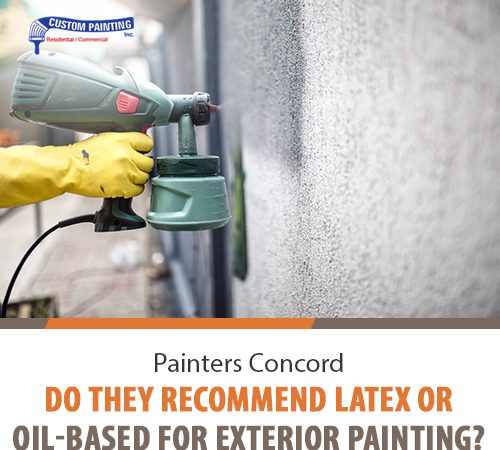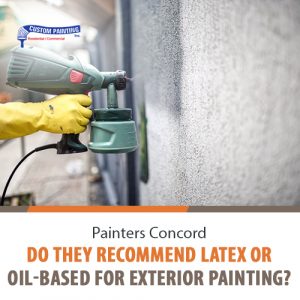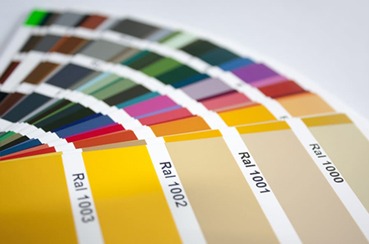

If you are in a similar situation right now, you can avail of the services from professional painters in Concord. If you need help deciding which paints to use, the experts will give you excellent advice and recommendations, as they naturally know all things paint.
How can you tell if the existing paint is latex or oil-based paint?
Every professional painter can identify whether the old paint on the wall is latex or oil-based. However, property owners may not be able to tell the difference.
Suppose you have just purchased a previously owned property and want to revamp it with new colors, but you have yet to determine whether the old paint is latex or oil-based. We will assume that the previous owner isn’t also around to help.
Here are a couple of surprisingly simple but effective methods that will help you identify right away whether the existing exterior surface has latex or oil-based paint:
- The “old cans” method is a no-brainer, but it is so simple that it may work. Since you have bought an older home or commercial building, there’s a high chance that used paint cans were stored somewhere – in the basement, garage, or shed. Look around to see if there are leftover cans of paint.
- The alcohol method has the painter take a clean rag and saturate it with denatured alcohol. Then, use the alcohol-soaked rag to rub the paint. If the paint comes off, it’s latex. If it doesn’t, it’s oil-based.
Latex paint
You may be surprised to read this, but latex paint doesn’t contain latex or rubber. Instead, it has acrylic or urethane. Latex paint is a water-based paint. Like acrylic paint, latex paint is made from acrylic resin.
Over the years, latex paints for exterior surfaces have significantly improved. They adhere better, resist more effectively against moisture, and emit less harmful fumes. Enhanced formulations also enable successful painting even in outside temperatures that are 50 degrees and below.
Professional or DIY painters have increasingly preferred latex paints for their homes and businesses.
Advantages of latex paint
While both professional and DIY builders widely use latex paint, it is prevalent for DIY painters for the following reasons:
- It is easier to work with than oil-based paints.
- It has a shorter drying time.
- It offers better coverage.
- It provides easier cleanup, requiring only soap and water.
- A new generation of latex paints is nearly as durable as oil-based paints.
- It is more flexible than oil-based paints.
- It is more breathable than oil-based paint and is less likely to crack.
- Once dried, latex paint becomes resistant to moisture.
- It is less odorous than oil-based paint.
- It is less prone to yellowing than oil-based paint.
- It is more eco-friendly than oil-based paint.
- It is an affordable paint option.
Disadvantages of latex paint
While there are advantages of latex paints, there are also disadvantages:
- It dries too quickly, especially under intense heat or direct sunlight, that brush or lap marks might show.
- Using latex paint can cause wood to swell.
- It does not coat metal as well as oil-based paints.
- It is often less durable, especially under harsh weather or climate conditions.
Why should you use latex paints for exterior painting?
In addition to the advantages stated above, latex paints are generally the best for exterior painting. Over the years, the improvement of paint technologies has allowed latex paints to become more durable. They are also very adaptable to changing weather conditions.
With the latest formulations of latex paints, DIY painters now have more flexibility concerning when they paint. The new latex paints include the opportunity to apply the paint in varying outdoor conditions. They can paint outside even on cold days.
Oil-based paint
Oil-based or alkyd paints contain either natural or synthetic oils as their base. Natural oil-based paints usually contain linseed oil, while synthetic ones contain synthetic alkyd. In addition, oil-based paints consist of a pigment and a resin in a solvent thinner. Once the thinner evaporates, the resin develops a hard coating.
If you are looking for a longer-lasting finish and plan to change the color infrequently, you should go for oil-based paints.
Advantages of oil-based paint
Oil-based paint is often the choice of several professional painters due to the following reasons:
- It is incredibly durable.
- Once dried, it becomes highly resistant to fingerprints, scuffs, scratches, moisture, and weather elements.
- It can be applied at temperatures below 50 degrees Fahrenheit.
- It coats metal very well.
- It covers effectively and thoroughly with only a single coat.
- It dries much slower, allowing painters more time to manipulate the paint or do touch-ups on the painted surface before it dries.
- It is very washable.
- It provides a smooth and glossy finish.
Disadvantages of oil-based paint
While there are advantages, there are also disadvantages to using oil-based paint. Since oil-based paint has less sustainable ingredients, its popularity has recently declined.
- While the oil paint’s slow drying time is advantageous, it can also be a downside. The wet paint will make dust and debris stick to the surface.
- Oil-based paint emits a strong odor, which is quite overwhelming.
- It is more challenging to apply than latex paint.
- As the oil-based paint dries, it gives off fumes that can be hazardous to health and the environment.
- Oil-based paint isn’t breathable, making it more subject to cracking and splitting over time.
- Cleanup with oil-based paint is more complicated, laborious, and risky, requiring mineral spirits or thinner to break it up.
Several states have regulated or banned oil-based paints, mainly because these paints contain volatile organic compounds (VOCs). As the paint dries, the VOCs vaporize and can present a health and environmental hazard. The vapors are why low-VOC and zero-VOC paints are becoming a preferred paint option among paint contractors and consumers.
Why should you use oil-based paints for exterior painting?
Oil-based paints are safer to use outdoors than indoors. Their smooth and durable finish makes them highly washable and resistant to traffic and weather elements. They are also an excellent choice for hardwood flooring.
Oil-based paints have a glossy, almost mirror-like finish, making them ideal for moldings and trim. They can also help in highlighting minor or inconspicuous architectural details.
Preparation and painting
You will always want to prepare the surface by scraping off peeling paint and sanding it to smooth it for the best results. If you find the previous layer of paint was latex, you should paint it with a new coat of latex paint.
If you find the previous layer of paint was oil-based, you can use either oil-based or latex to paint the new layer. Oil-based paints will usually adhere just fine.
You only want to apply oil-based paint over latex paint if you sand the surface and apply primer between each layer.
If the last coat of paint is old, the paint could be lead-based. There are several tests to determine the presence of lead, but these tests are best done by a trained professional. If traces of lead in paint are indeed found, you will want to use protective measures to keep the lead from affecting you or your family. You can find out more from the National Lead Information Hotline at 1-800-424-LEAD or by visiting http://www.epa.gov/lead for the EPA’s recommendations.
Conclusion
While latex and oil-based paints are excellent for exterior painting, latex paints have performed better in recent years. They offer a safer and environmentally friendly alternative to oil-based paints. A new generation of latex paints delivers superior performance for various exterior surfaces. These are the reasons why more professional painters use and recommend latex paints for exterior painting.
Do you need an expert at the helm of your exterior paint job? Give professional painters in Concord a call! They can take the hassle of painting your home or business out of your hands. You can sit back and enjoy the results!

